On a September afternoon in 2021, Alex Taylor-McCallum stood on the 900 block of Pandora Avenue in downtown Victoria, armed with a bucket of paint, roller brushes and dozens of cans of spray paint.
Though the sun would soon be setting, Taylor-McCallum was patient with the residents of the neighbourhood as they moved their tents and belongings out the way for him to begin the mural he was painting in honour of residential school survivors alongside his friend and collaborator Emma Joye Frank, a fellow Kwakwakaʼwakw artist.
Across Greater Victoria, Taylor-McCallum’s work stands apart from most other public art. For the past few years, the Kwakwakaʼwakw and Nuu–chah–nulth artist has been using spray paint to create large-scale Indigenous art. He has painted large pieces of work on Victoria’s few legal walls for graffiti. And this wall on Pandora is the first of what will become many professional mural jobs.
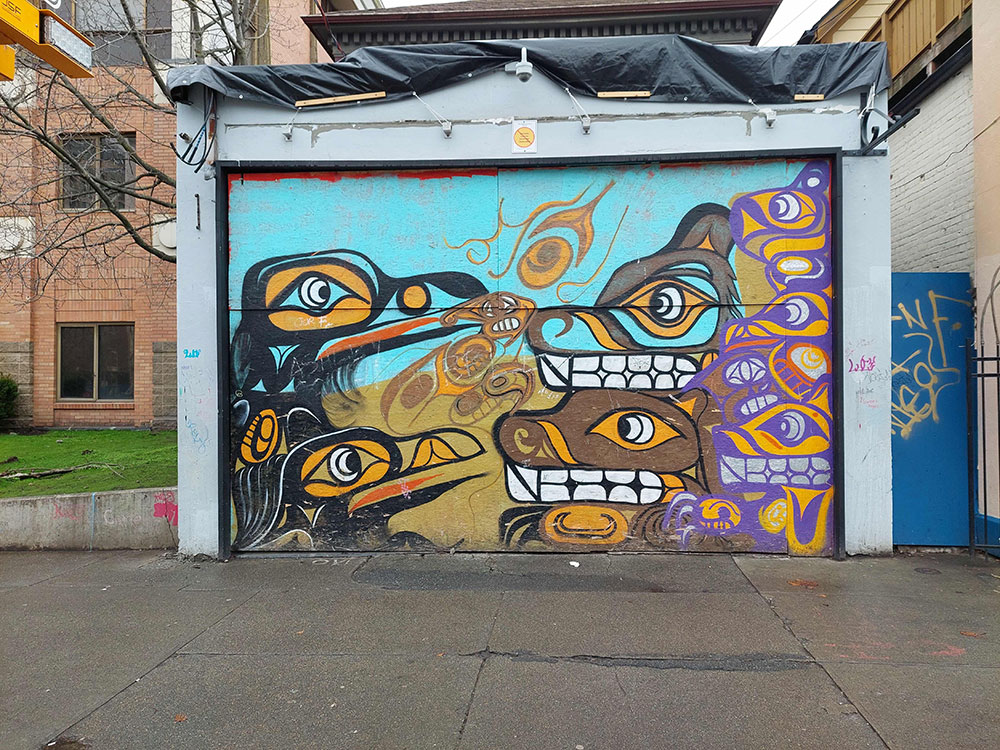
Taylor-McCallum is 30-years-old, and has grown up and spent most of his life in Victoria. Today, as he welcomes me into the Red Cedar Café on Douglas Street, where he has been working as a cook for nearly two years, he’s strong and grounded.
He’s arrived at a moment in his life that feels more promising than ever. Work is steady, horizons are opening up and he’s greeting the new year with optimism. “Spray paint, more than anything, has brought me closer to my culture,” he explains.
His work as an aerosol artist has helped him honour the memory of ancestors and community members who have died. The process has helped him work through the intergenerational trauma that he and other Indigenous people continue to carry with them. He emphasizes the need for more public Indigenous artwork in Victoria, a city that carries a dark colonial history.
“There’s a lot of displaced native people that end up in places like Victoria where they don’t have a connection to their roots, and they don’t see a lot of native representation,” he says. But Indigenous public artwork is a connective tissue that is healing and affirming. “It uplifts their spirits to see that.”
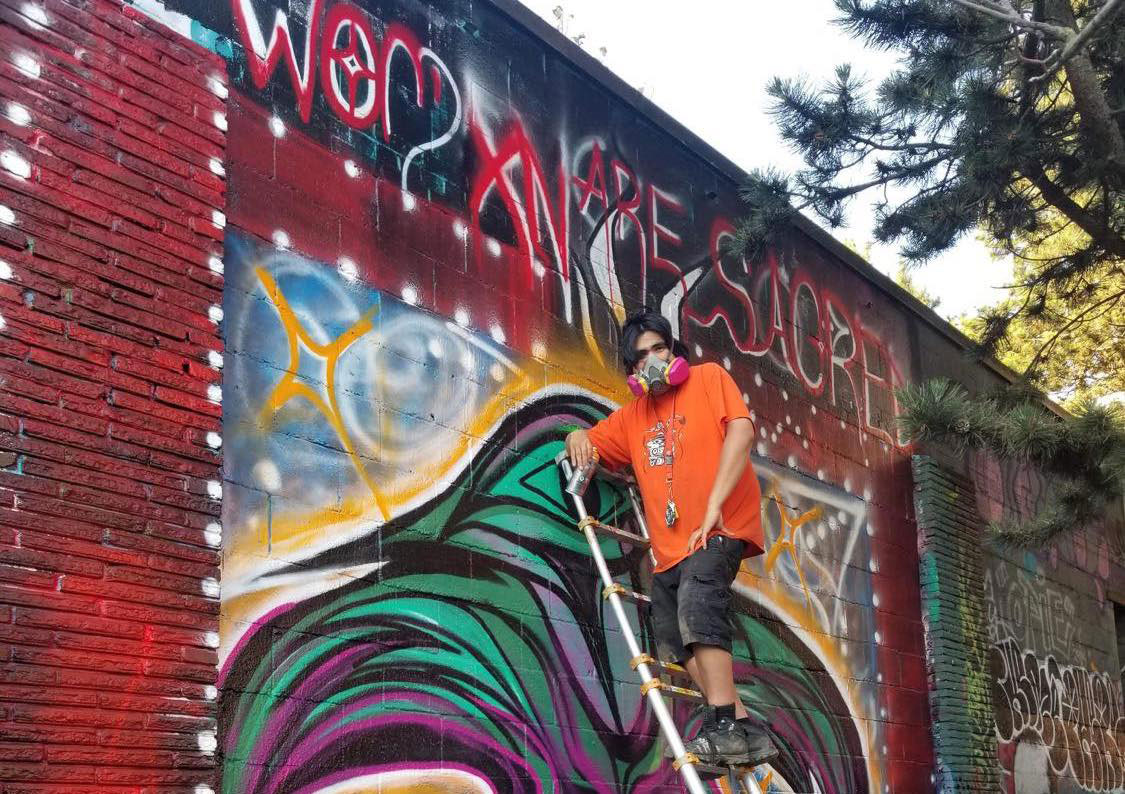
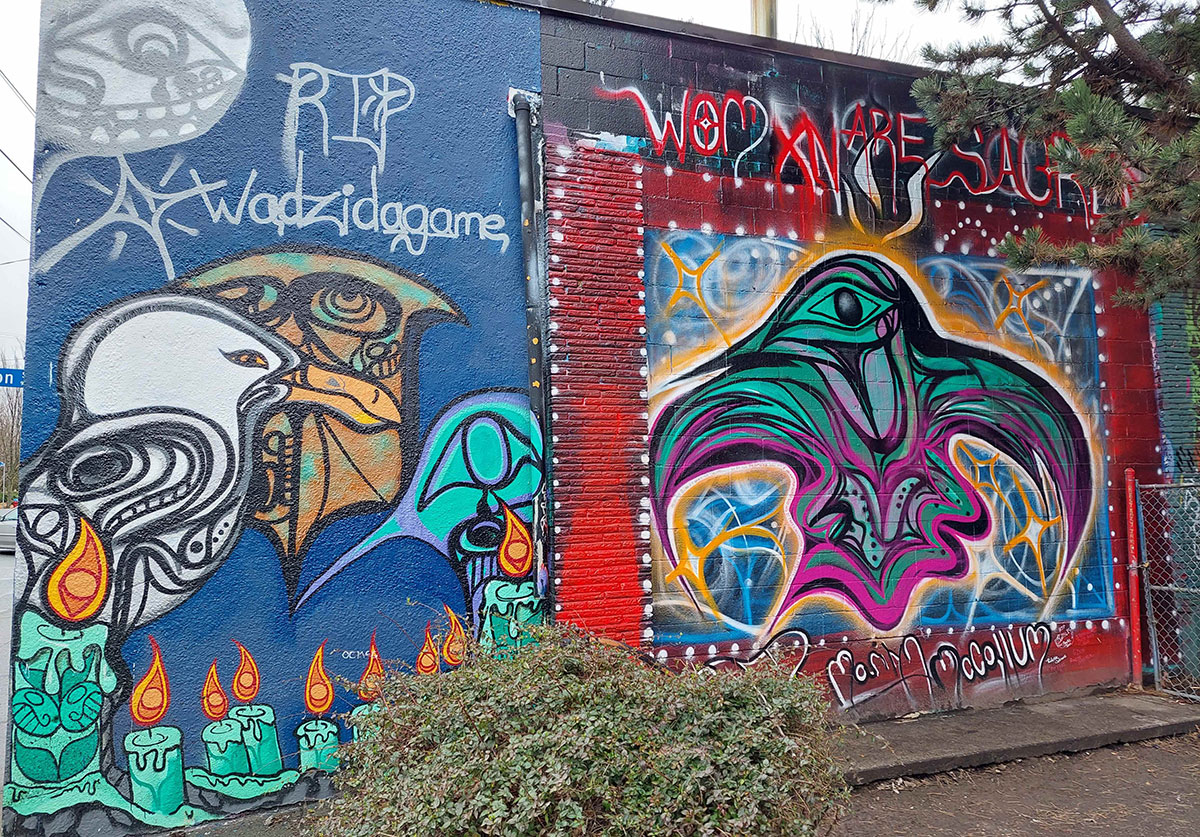
On healing and remembering
Two of Taylor-McCallum’s murals are currently on the side of Wildfire Bakery, a legal graffiti wall on Quadra Street. The mural depicts a hummingbird in honour of Marilyn McCallum, his late grandmother. Marilyn was murdered when Taylor-McCallum was eight.
“It was a huge change in my life, and where a lot of my trauma stems from,” he says, recalling her death as his first experience with grief and loss.
“I didn’t understand the concept of someone passing away. Even at her funeral, it didn’t really click in my mind that she was gone. It didn’t really become real until I was at a memorial service for her in the Lekwammen Bighouse in Esquimalt. There was a fire in the bighouse, and an ember flew in my direction, and slowly it landed on my face, and I started crying. I was sitting in the bighouse, like — this is real, my grandma is gone. I’m not gonna see her again. When that ember hit me, I started bawling,” he says.
It was not long after the loss of his grandmother that he began to experiment with drugs and alcohol, Taylor-McCallum recalls. He describes his experience painting a mural for his late uncle Mike Ambers in the spring of 2021 as central to the process of moving through loss. “When honouring a family member with these memorial pieces, it becomes ceremonial. It becomes much more than graffiti and putting your name up,” he explains.
“You’re doing these animals that are representative of people that have passed away. And not just them — representative of their lineage, of where they come from, and you gotta take that work seriously and try to do your best. It’s always a learning process.”
It was also one of the moments that led to his decision to quit drinking.
“You can’t do native art when you’re shaking from alcohol, when your spirit's not with you,” he says. As of today, Taylor-McCallum says he is grateful for nearly 20 months of sobriety.
Though the art on the walls of Wildfire Bakery is ever-changing, Taylor-McCallum’s mural in memory of Mike Ambers has been there for over a year. “I think that just shows how much respect there is for it, and for him. I really felt the need to do that. Not just for him, but for everyone else who’s lost their lives down there. The fentanyl epidemic has claimed so many lives on that block alone.”
The mural, he says, is “something that really brought some healing to my late uncle’s family.”
Taylor-McCallum also credits his job at the Red Cedar Café as something that has helped him maintain his sobriety.
"Since I’ve kicked that habit out of my life, everything I’ve wanted to do, almost, has come true now that I’m sober. People want to pay me to paint their suburban driveways with spray paint, I’m painting at men’s rehabilitation facilities, and doing things that uplift communities — doing things on Pandora Avenue for people that have passed away.”
There are many people to mourn and remember. “There’s a mix of our Elders, knowledge keepers and matriarchs, grandpas and grandmas, who are passing away of old age — but on the contrary, there’s a lot of younger people passing away due to fentanyl, drug and alcohol addiction, health-related problems due to addiction,” he says.
“There’s not enough places for me to paint, to honour all these people who passed away.”
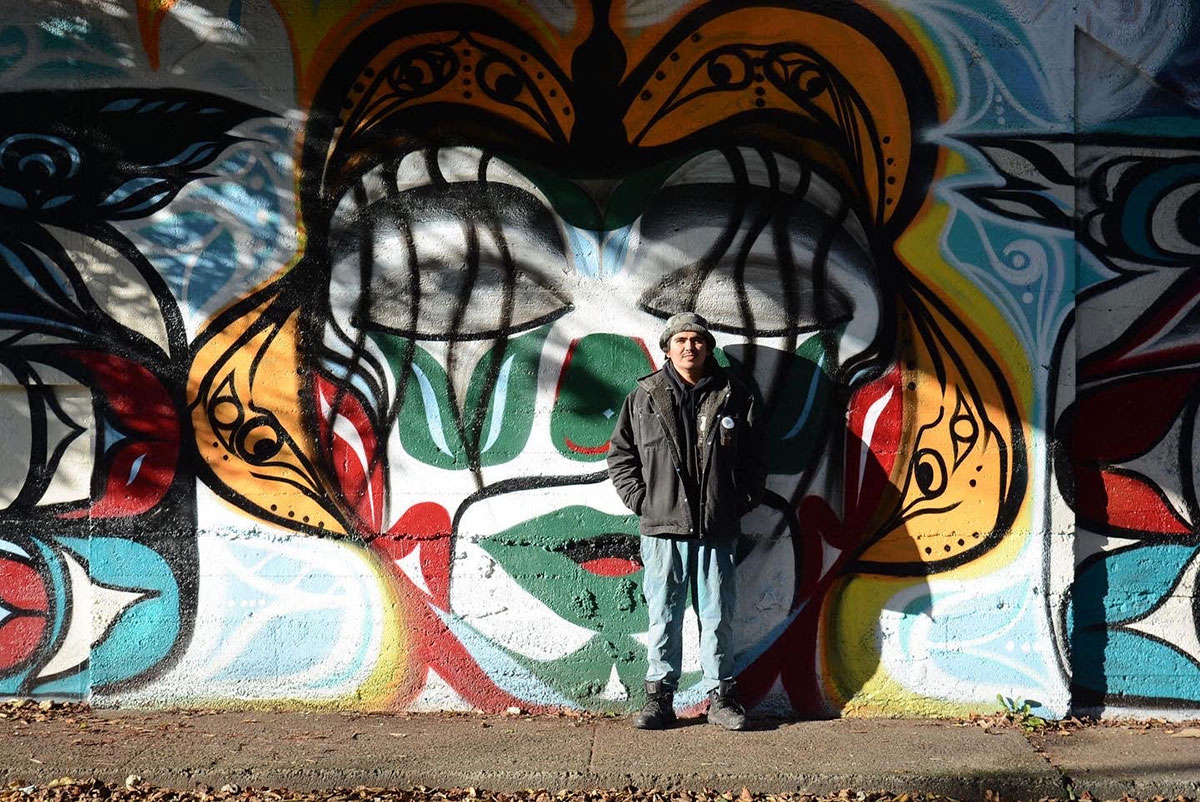
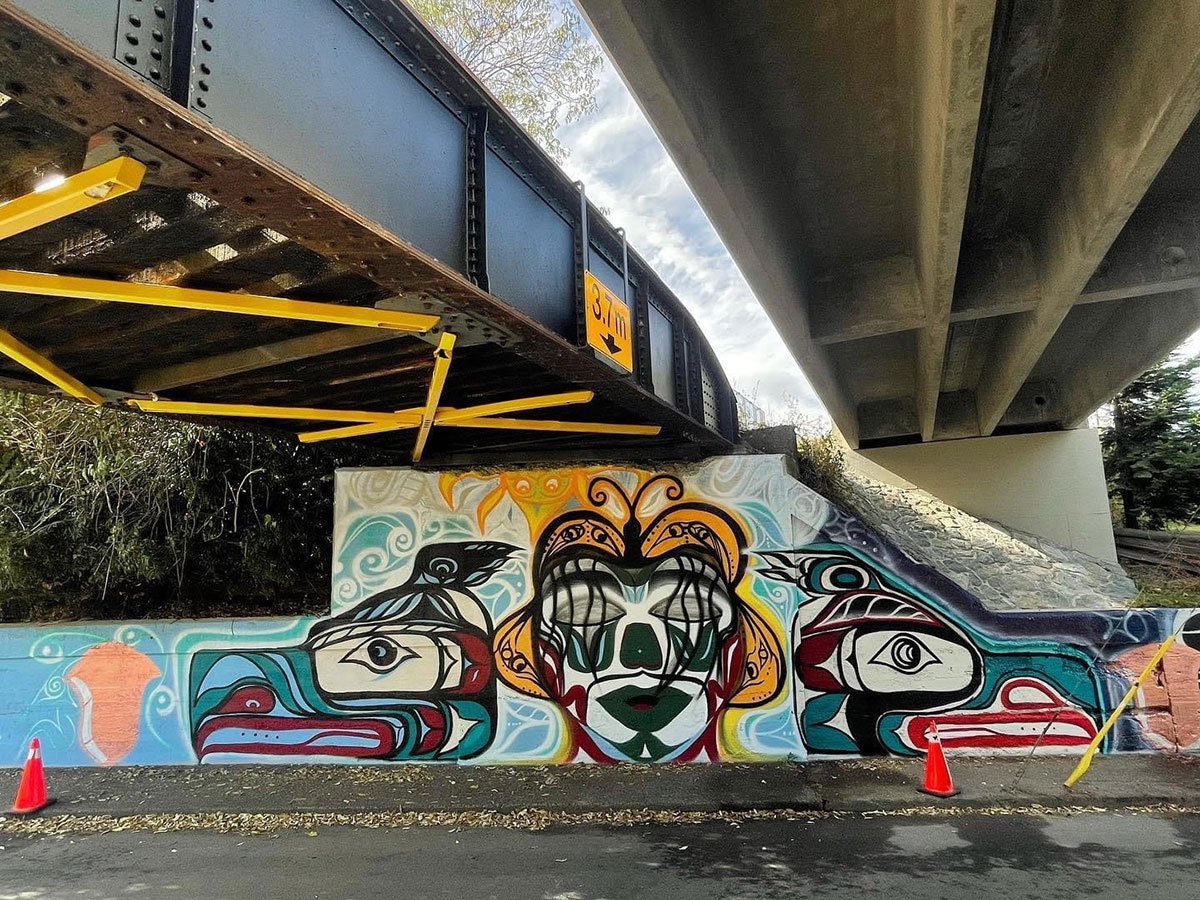
Indigenizing art
In addition to his recent work as a muralist, Taylor-McCallum’s creative spirit has seen him engage with a variety of art forms. In his teenage years, he was an avid filmmaker, writing and acting in two short films of his own, as part of a trilogy that he hopes to one day complete.
“When I was 16, I became really interested in film, and the idea of Indigenous film, because native people have been so misrepresented in early racist westerns and cartoons,” he says. The desire to further Indigenize a variety of art forms, genres and mediums is one of the driving factors behind the multifaceted artist's inspiration. It has pushed him to become involved in writing, theatre, hip-hop, film and graffiti art.
Growing up, Taylor-McCallum says that he never had a mentor in Indigenous art. “My Uncle Beau was my mentor in life, in general, our culture and teachings,” he says, of his relationship with his late uncle and celebrated visual artist Beau Dick.
His interest in graffiti art developed in his 20s, notably during a time spent living in Vancouver when he hung out at Shop Wrong, an artist collective and gallery space on East Hastings. There, he met Indigenous graffiti artists such as Corey Bulpitt, whom he credits with inspiring him to try out the medium of spray paint for himself.
He’s refined his craft through the help of the community of graffiti and aerosol artists in Victoria. Victoria artists Sigil, Pesto, Kay Gallivan and Skuzzabot have helped light his way, he says.
Throughout our conversation, Taylor-McCallum frequently refers back to a mural he painted with the artist Sigil at the Esquimalt Trackside Art Gallery as a turning point in his artistic career. This piece, done on his own time, money and paint, became a big part of his portfolio. He credits it with helping him get his first paid mural on Pandora Avenue, and for one of the largest and most recent pieces he painted for a mural fest in Esquimalt, only minutes away from the Trackside Art Gallery walls.
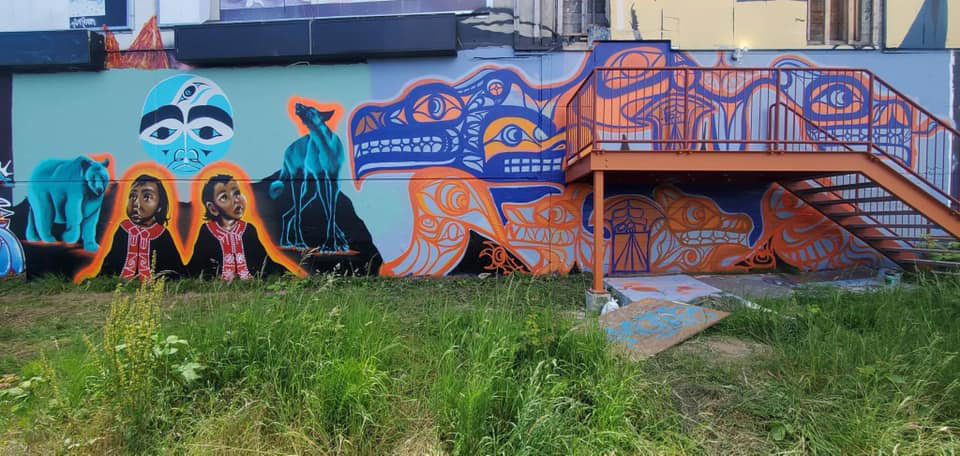
Public recognition
In September 2022, Taylor-McCallum was named the winner of the Victoria ProArt Early Career Artist award. “It was a very bizarre experience,” he admits. He describes making his acceptance speech to a crowd, including the mayor and other city officials, for an award he won, in part, due to spray painting. “What I said was that this would not be possible if I had not excluded alcohol from my life, as I put an end to the intergenerational traumatic repercussions of colonization — this cycle ends with me and my kids.”
Shortly after receiving the award, Taylor-McCallum performed in im:print, a theatre show featuring a number of Indigenous and immigrant performers telling their stories through various mediums. Though he admits he was hesitant at first, he showed up to an audition at the suggestion of one of his aunts. For the audition, he decided to perform a song he had written.
“They were kinda shook by it. One lady was in tears,” he says of the audition. “Through that, I kind of invaded my way into the theatre world, and really took my words to the stage there at UVic, and shocked people night after night. What I have to say is not meant to be said quietly.”
His lyrics are meant to have beats behind them, he says, but for now, he performs them in the fashion of a spoken word piece. He recites the first few bars for me, his booming voice echoing around the walls of Red Cedar Café.
“K-K-Kanada red and white, feed us all firewater to fuel the duels and fights. I try to stay resilient, despite how you’ve tried to set my great great grandpas’ box of treasures alight. Shut down our ceremonial functions in the name of the lord with guns and swords, commit child abductions, attempt to chop down our tree of life and replace it with dysfunction, national intergenerational trauma, now makes it hard to function…”
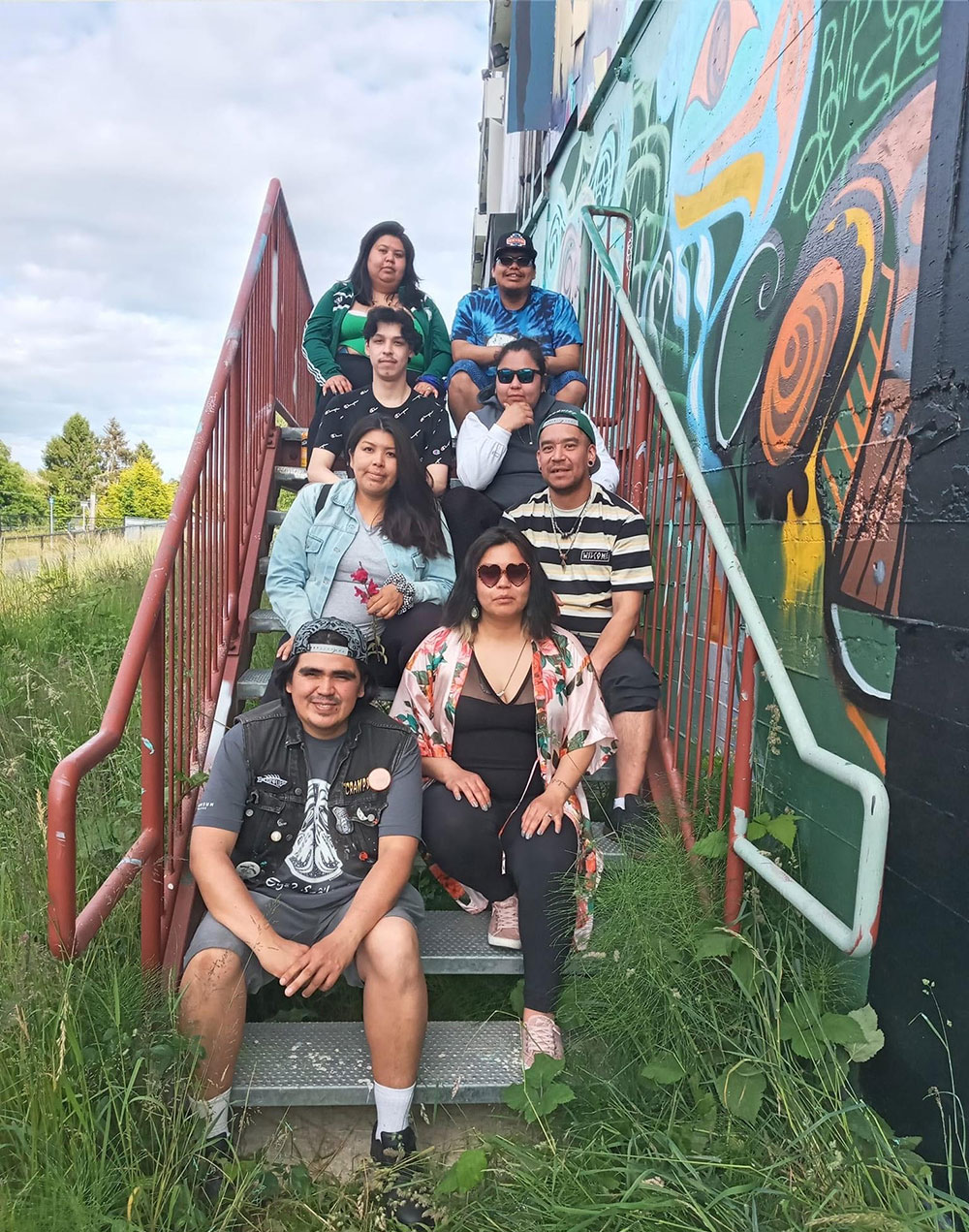
After his performance at im:print, Taylor-McCallum was invited to perform in a Poetry Meets Visual Arts performance at UVic in November. Opportunities lead to one another, he says. As a result of the poetry performance at UVic, he says, he will be performing in the Voices in Circle variety show at the UVic Farquhar auditorium in February.
After a year filled with milestones, Taylor-McCallum only has higher hopes for the future.
“Being able to get paid for something you’re passionate about really uplifts the spirit in this world where, y’know, money isn’t everything, but unfortunately we have to live in the balance between the natural world and this colonial material world,” he says.
“It’s really through doing this art, being there for my kids, being able to do things that I love to support myself and my kids, it really inspires me to live a good life and keep doing it, keep pushing the boundaries, and keep writing.” ![]()
Read more: Indigenous, Rights + Justice, Art


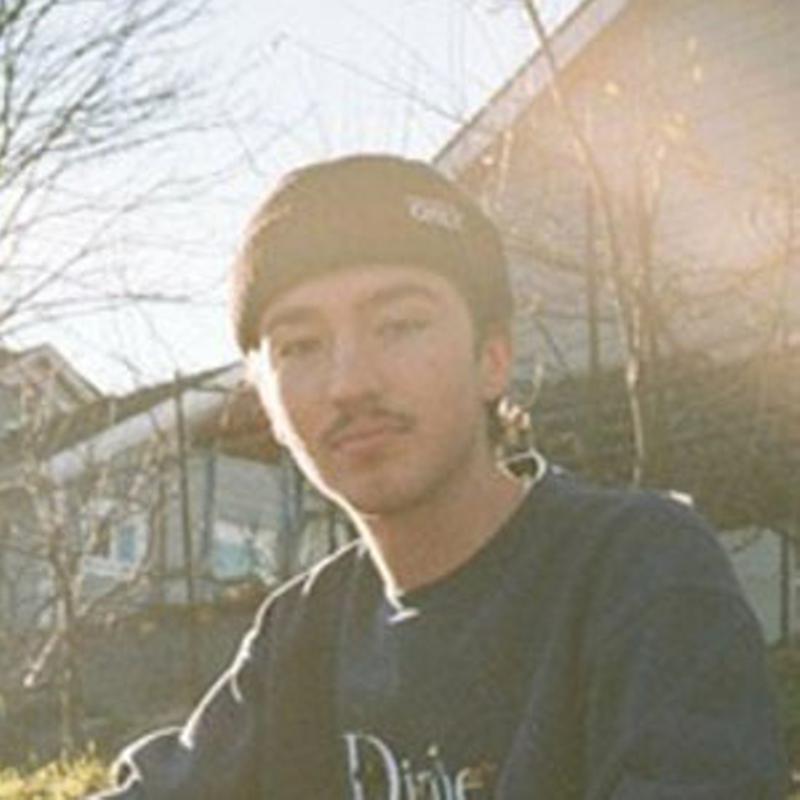

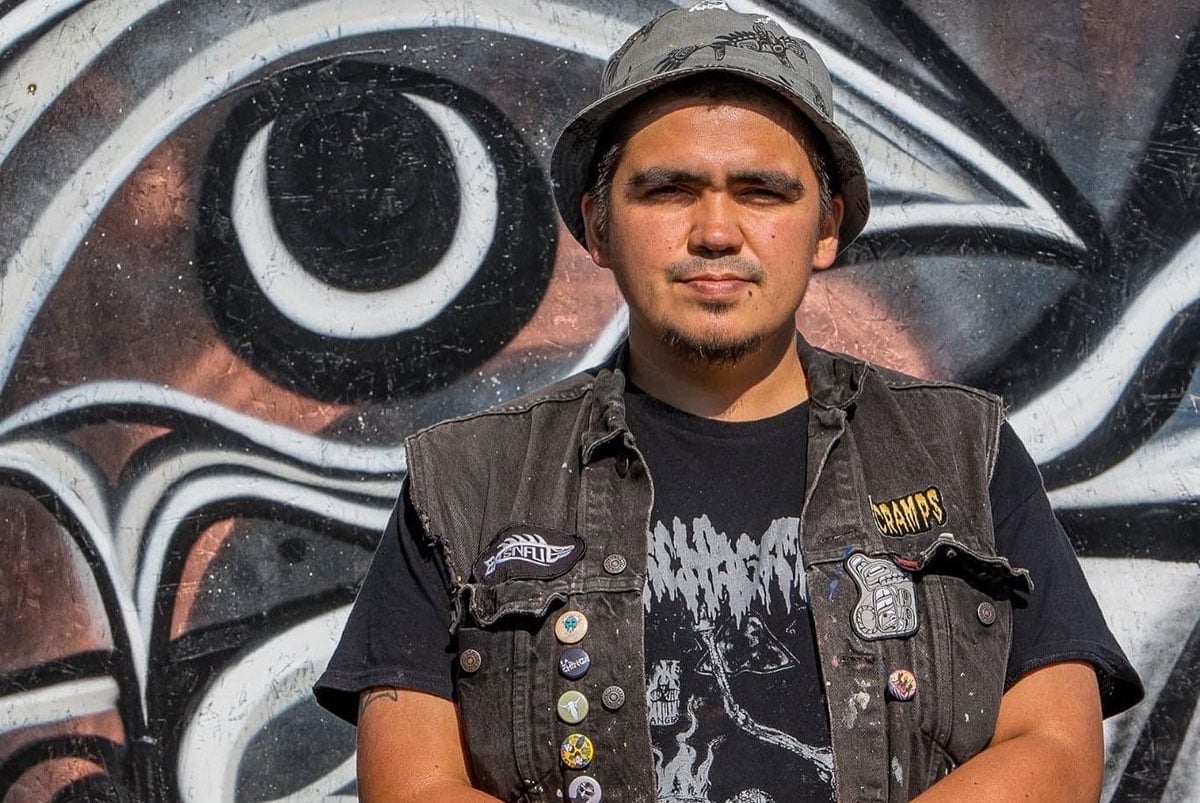












Tyee Commenting Guidelines
Comments that violate guidelines risk being deleted, and violations may result in a temporary or permanent user ban. Maintain the spirit of good conversation to stay in the discussion.
*Please note The Tyee is not a forum for spreading misinformation about COVID-19, denying its existence or minimizing its risk to public health.
Do:
Do not: